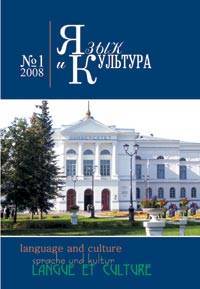Personal-competency basis of philological education (foreign languages)
The system of continuous foreign language / multilingual philological education is a multi-stage educational trajectory that determines foreign languages teaching in the context of continuity of educational levels. Our previous study presented a general idea of the educational goals of this system. This article scrutinises the development of the competence basis of philological education at the stage of high school (philological profile) and at the tertiary level of language education (bachelor and master programs) through the prism of the learner's personality. The article presents the general educational goal of foreign language (multilingual) philological education in terms of a socio-, inter- and multiculturally-oriented multilingual personality as a subject of continuous development. The goal of foreign languages teaching is seen as the formation of the learner's communicative personality as the subject of intercultural communication due to the formation of three competence groups: general, subject, and specialised. The study identifies four enlarged areas of general / key competencies and examines the development of subject competencies within the foreign-language intercultural communicative competence, which interacts with specialized competencies, at school and university levels. The flexibility of the competence basis contributes to students' individualisation in their selfidentification and self-realisation, which is to be ensured by the possibilities to build individual educational routes at the school and university stages of foreign-language philological education. At the university stage, the professionally-communicative personality is being formed, focusing on linguistic and sociocultural scientific and practical activities under the interaction of liguocultures, thus determining their specialism, and capable of professional flexibility and making use of universal competence patterns so as to orientate in related activities. The empirical study uncovered several problems related to the formation of competence aspects in high school and university. Regarding high school, these problem areas are as follows: the ability to juxtapose the scope of language-item meanings in their mother tongue and the one in a foreign language by means of translation and analysis of contexts of use, on the one hand, and linguo-cultural analysis, on the other; the acquisition of basic knowledge of the system and structure of a language as well as basics of stylistics, lexicology and other branches of language study; the skills of dealing with varied language genres, such as analyzing and creating texts that correlate with the requirements of the Russian State Exam, dealing with genres from different fields of foreign-language use (running commentary, excursion, etc.), taking into account students' individual aspirations; the purposeful development of the skills of interaction and mediation; the elementary skills of literary analysis that are developed on the basis of target-language literature as well as foreign and native literatures being juxtaposed; the ability to discover and interpret differences in norms and beliefs in native and foreign cultures; the mastering of the basic patterns of communicative behavior in the context of intercultural communication, on the one hand, in situations of everyday communication and, on the other hand, in situations of professionally-oriented communication; the development of information culture: the ability to use linguistic electronic resources, interest in intercultural communication through ITC resources (blogs, social networks, messengers, etc.); planning the use of a foreign language in order to continue education (on the basis of special thematic blocks, vocational guidance texts and assignments); the development of regulatory strategies through the language portfolio, that is the use of the portfolio for collecting the best works, goal-setting, planning, individualization of content, and self-esteem. In relation to university, these problem areas are: the mastering of linguistic units at the level of foreign-culture concepts; striving to keep thesauri which include elements of conceptual analysis, semantic and linguo-cultural fields; the linguo-stylistic components of competence: the receptively-analytical and the productive one (the ability to create texts of various styles and genres); the formation of effective intercultural-communication strategies (compensation, acculturation, the overcoming of stereotypes and culture shock, communicative behavioral models, etc.); the expansion of professional self-identification directions (the formation of "metaprofessional-ism") due to aiming at variable situations of professional communication; the ability and willingness to draw on the knowledge of other languages; the purposeful development of fluency and accuracy; the skills of professionally-oriented interaction and mediation; the development of the ability to recognize inter- and meta-textual links; the ability to correctly use precedent and recurrent texts / utterances in different language genres; the ability to convert text into a specific genre by using reference connotations; the ability to work with current multi-genre online resources (online versions of newspapers and magazines, the blogosphere, etc.) for the purpose of philological analysis of various types and in order to create own Internet content. In sum, the integrative potential of the described competence base makes it possible to implement philological specialization in its context and individualize the formation of the communicative personality. The research opens a number of perspectives described in the article.
Keywords
иноязычное / многоязычное филологическое образование, обучение иностранному языку, коммуникативная личность, иноязычная межкультурная коммуникативная компетенция, специализированные компетенции, общие компетенции, foreign language / multilingual philological education, foreign language teaching, communicative personality, foreign-language intercultural communicative competence, specialized competencies, general competencesAuthors
| Name | Organization | |
| Kolesnikov A.A. | Ryazan State University named after S.A. Yesenin | kolesnikow@list.ru |
| Polyakov O.G. | Tambov State University named after G.R. Derzhavin | olegpo@rambler.ru |
References

Personal-competency basis of philological education (foreign languages) | Yazyk i Kultura – Language and Culture. 2017. № 40. DOI: 10.17223/19996195/40/15
